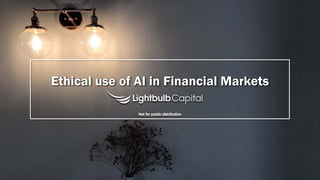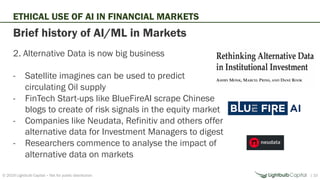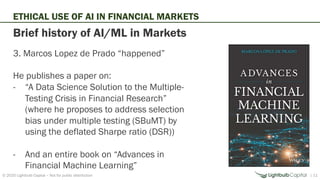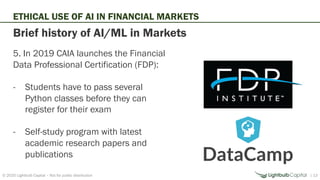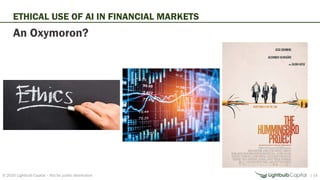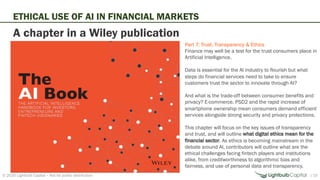Qu speaker series:Ethical Use of AI in Financial Markets
- 1. Qu Speaker Series Ethical Use of AI in Financial Markets 2020 Copyright QuantUniversity LLC. Hosted By: Sri Krishnamurthy, CFA, CAP sri@quantuniversity.com www.qu.academy 11/12/2020 Online https://quspeakerseries13.splashthat.com/
- 2. 2 QuantUniversity • Boston-based Data Science, Quant Finance and Machine Learning training and consulting advisory • Trained more than 1000 students in Quantitative methods, Data Science and Big Data Technologies using MATLAB, Python and R • Building a platform for AI and Machine Learning Exploration and Experimentation
- 3. 3 For registration information, go to https://QuFallSchool.splashthat.com
- 5. 5
- 6. 6
- 7. 7 Speakers Daniel (Dan) is the Founder of Singapore based Lightbulb Capital. The firm was founded in 2014 in Hong Kong to help realize the potential of innovation and novel technologies to transform financial services. Today the company is a corporate finance boutique with a focus on FinTech and blockchain. Dan is appointed affiliate faculty of Singapore Management University for Innovation in Finance, FinTech, Blockchain, and digital assets. He is also a visiting professor at IE business school in its top-ranked Master in Finance program. He is also a Review Editor for Frontiers Financial Blockchain academic journal and works on research projects. In addition, he is a frequent speaker at seminars on Blockchain and Innovation in Financial Services. Before starting the firm, Dan was Chief Operating Officer (COO) and an Executive Director of HSBC Securities (Singapore) Pte Limited. He was previously also the IT Head of HSBC’s Investment Bank in Singapore and Japan. Dan has over 19 years of Investment Banking Technology experience at UBS in both Germany and the UK, Barclays Capital in both Singapore and Tokyo, as well as Close Brothers in Frankfurt, his hometown. He is also a Ph.D. Candidate within the Finance department of Rotterdam School of Management, Erasmus University where he researches Blockchain and AI and it effects on Finance. Previously he graduated with a Master of Science in Innovation from Singapore Management University and holds a Master in Finance from IE business school in Madrid, Spain.
- 8. Ethical use of AI in Financial Markets Not for public distribution
- 9. AGENDA © 2020 Lightbulb Capital – Not for public distribution | 2 • Authors • Introduction (to AI/ML in Financial Markets) • Who needs to control who? • Governments & the ethical use of AI • Principles – applied to Financial Markets: • Fairness • Privacy • Transparency • Explainability • Accountability • Conclusion • Q&A • Contact Information
- 10. INTRODUCTION © 2020 Lightbulb Capital – Not for public distribution | 3 Authors Dan Liebau Co-Author Current • Founder of Singapore based Lightbulb Capital, Singapore and Hong Kong • Affiliate Faculty of Singapore Management University, Singapore • Lecturer at Rotterdam School of Management, Erasmus University, Netherlands • Review Editor for Frontiers Financial Blockchain, London Previous Appointments • Visiting Professor at IE business school, Spain • Chief Operating Officer (COO) and an Executive Director of HSBC Securities (Singapore) Pte Limited. • IT Head of HSBC’s Investment Bank in Singapore and Japan • Head of IT, Close Brothers • Equities IT, Barclays Capital • Equities IT, UBS Education • Ph.D. Candidate at Erasmus University, Research focus on: Blockchain and AI and it effects on Finance, Netherlands • Master of Science in Innovation from Singapore Management University, Singapore • Master in Finance from IE business school in Madrid, Spain
- 11. INTRODUCTION © 2020 Lightbulb Capital – Not for public distribution | 4 Authors Tiffany Wong Co-Author Current • Senior Associate at PwC London in the Financial Services Risk and Compliance • area • She specialises in Technology Risk and Digital • Has led the PwC "Disruptive Technology Working Group" Education • First Class from BSc (Hons) Actuarial Science at CASS Business School • CFA Charter-holder • Chartered Accountant • Has contributed to In the CFA Institute Consultation of "Artificial Intelligence and its potential impact on the CFA Institute Code of Ethics and Standards of Professional Conduct”
- 12. ETHICAL USE OF AI IN FINANCIAL MARKETS © 2020 Lightbulb Capital – Not for public distribution | 5 Definition: Machine Learning Machine learning is an application of artificial intelligence (AI) that provides systems the ability to automatically learn and improve from experience without being explicitly programmed. It focuses on the development of computer programs that can access data and use it to learn for themselves. (Source: Google) In the Financial Markets context it is NOT: - Algorithmic trading (usually expert systems) - High frequency trading (fast but often also static)
- 13. ETHICAL USE OF AI IN FINANCIAL MARKETS © 2020 Lightbulb Capital – Not for public distribution | 6 Definition: Natural Language Processing Natural language processing (NLP) is (…) concerned with the interactions between computers and human (natural) languages, in particular how to program computers to process and analyse large amounts of natural language data. (Wikipedia)
- 14. ETHICAL USE OF AI IN FINANCIAL MARKETS © 2020 Lightbulb Capital – Not for public distribution | 7 Definition: Data Science Data science is a multi- disciplinary field that uses scientific methods, processes, algorithms and systems to extract knowledge and insights from structured and unstructured data. (Wikipedia)
- 15. ETHICAL USE OF AI IN FINANCIAL MARKETS © 2020 Lightbulb Capital – Not for public distribution | 8 Brief history of AI/ML in markets 5 milestones in the use of AI in Financial Markets
- 16. ETHICAL USE OF AI IN FINANCIAL MARKETS © 2020 Lightbulb Capital – Not for public distribution | 9 Brief history of AI/ML in Markets 1. Renaissance Technologies started in the in New York in 1982, they were the first to use Machine Learning techniques in Financial Markets
- 17. ETHICAL USE OF AI IN FINANCIAL MARKETS © 2019 Lightbulb Capital – Not for public distribution | 10 Brief history of AI/ML in Markets 2. Alternative Data is now big business - Satellite imagines can be used to predict circulating Oil supply - FinTech Start-ups like BlueFireAI scrape Chinese blogs to create of risk signals in the equity market - Companies like Neudata, Refinitiv and others offer alternative data for Investment Managers to digest - Researchers commence to analyse the impact of alternative data on markets
- 18. ETHICAL USE OF AI IN FINANCIAL MARKETS © 2020 Lightbulb Capital – Not for public distribution | 11 Brief history of AI/ML in Markets 3. Marcos Lopez de Prado “happened” He publishes a paper on: - “A Data Science Solution to the Multiple- Testing Crisis in Financial Research” (where he proposes to address selection bias under multiple testing (SBuMT) by using the deflated Sharpe ratio (DSR)) - And an entire book on “Advances in Financial Machine Learning”
- 19. ETHICAL USE OF AI IN FINANCIAL MARKETS © 2020 Lightbulb Capital – Not for public distribution | 12 Brief history of AI/ML in Markets 4. In 2018 Gu, Kelly and Xiu publish the paper “Empirical Asset Pricing via Machine Learning” on the SSRN platform Key finding: Machine Learning can provide an improved description of expected return behaviour compared to traditional forecasting methods
- 20. ETHICAL USE OF AI IN FINANCIAL MARKETS © 2020 Lightbulb Capital – Not for public distribution | 13 Brief history of AI/ML in Markets 5. In 2019 CAIA launches the Financial Data Professional Certification (FDP): - Students have to pass several Python classes before they can register for their exam - Self-study program with latest academic research papers and publications
- 21. ETHICAL USE OF AI IN FINANCIAL MARKETS © 2020 Lightbulb Capital – Not for public distribution | 14 An Oxymoron?
- 22. ETHICAL USE OF AI IN FINANCIAL MARKETS © 2020 Lightbulb Capital – Not for public distribution | 15 A chapter in a Wiley publication Part 7: Trust, Transparency & Ethics Finance may well be a test for the trust consumers place in Artificial Intelligence. Data is essential for the AI industry to flourish but what steps do financial services need to take to ensure customers trust the sector to innovate through AI? And what is the trade-off between consumer benefits and privacy? E-commerce, PSD2 and the rapid increase of smartphone ownership mean consumers demand efficient services alongside strong security and privacy protections. This chapter will focus on the key issues of transparency and trust, and will outline what digital ethics mean for the financial sector. As ethics is becoming mainstream in the debate around AI, contributors will outline what are the ethical challenges facing fintech players and institutions alike, from creditworthiness to algorithmic bias and fairness, and use of personal data and transparency.
- 23. ETHICAL USE OF AI IN FINANCIAL MARKETS © 2020 Lightbulb Capital – Not for public distribution | 16 Quote No. 1: Who (needs to) control who? “Humans have found it impossible to encode ethical standards in finance, so we generally get principles-based guidance like ‘do the right thing’. It will take AI a long time to learn the difference between right and wrong on matters where human experts often disagree.” Matthew Cannon, Managing Partner, Hedge Fund Modular Asset Management, Singapore
- 24. ETHICAL USE OF AI IN FINANCIAL MARKETS © 2020 Lightbulb Capital – Not for public distribution | 17 Quote No. 2: Who (needs to) control who? “Financial transactions are fraught with agency problems. One solution is to replace human judgement with smart, systematic processes. Another solution is to deploy algorithms that monitor human decisions in search the for biases. In both cases, AI has an important role to play.” Dr Marcos Lopez de Prado, True Positive Technologies LP, New York
- 25. ETHICAL USE OF AI IN FINANCIAL MARKETS © 2020 Lightbulb Capital – Not for public distribution | 18 Governments start to pay attention to AI ethics
- 26. ETHICAL USE OF AI IN FINANCIAL MARKETS © 2019 Lightbulb Capital – Not for public distribution | 19 Even China is in on it…
- 27. ETHICAL USE OF AI IN FINANCIAL MARKETS © 2020 Lightbulb Capital – Not for public distribution | 20 Zooming in on Financial Markets Our chapter focuses on operationalizing principles to facilitate the ethical use of AI in Financial Markets AI principles for fair use in financial markets Fairness Privacy Transparency Explainability Accountability
- 28. ETHICAL USE OF AI IN FINANCIAL MARKETS © 2020 Lightbulb Capital – Not for public distribution | 21 Fairness Background What is the issue? Recommendation example Treating stakeholders impartially and just, without taking unfair advantage of them is not a new matter in markets Perhaps the fairness issue is as old as financial markets themselves Reinforcement learning algorithms get compensated through a feedback loop depending on their performance. They will learn about patterns in the training data suggest these practices to exploit them profitably. When building AI trading algorithms, we recommend defining boundaries to delineate fair from unfair trading activity ML algorithms should not be allowed to engage in spoofing, wash trading, stock bashing or pump & dump / run- type of activities Financial Market regulation does this today for human traders
- 29. ETHICAL USE OF AI IN FINANCIAL MARKETS © 2020 Lightbulb Capital – Not for public distribution | 22 Privacy Background What is the issue? Recommendation example The Cambridge Dictionary defines privacy as “someone's right to keep their personal matters and relationships secret” (Cambridge Dictionary, 2019). The centralized financial marketplaces of today display weaknesses when it comes to private data protection. Hong Kong’s Central Bank reported that in 2018, cyber attacks on financial services providers doubled (Hong Kong Monetary Authority, 2019). It is easy to imagine how hackers will use AI to exploit markets unfairly by getting access to private data to use it to their advantage in the markets. For example, the market participants may have to disclose ultimate beneficial ownership data of their executives. If illegally obtained, such data could be used to augment the dataset fed to an AI algorithm to achieve superior trading results without observing privacy rights. One solution to preserving the privacy of actors in the financial markets could be the use of Zero-Knowledge Proofs (Simari, 2002). Secret information does not have to be revealed for counterparts to establish probabilistic certainty of, for example, identity-related data. If stored on a blockchain, data owners could selectively share Zero-Knowledge Proofs on data attributes more securely and as required to interact in the more private markets of the future.
- 30. ETHICAL USE OF AI IN FINANCIAL MARKETS © 2019 Lightbulb Capital – Not for public distribution | 23 Transparency Background What is the issue? Recommendation example Transparency is the quality of making something obvious or easy to understand (Merriam-Webster, n.d.). In our context, it refers to the public’s view of how and if AI’s functionality is aligned with reality. In 2018, an AI hedge fund, Tyndaris, lost $20 million of an investor’s funds. The investor sued the fund because the losses wouldn’t have occurred if the machine learning algorithm in use was as sophisticated as the salesperson claimed it was (Beardsworth et al., n.d.). The case has not been settled in court at the time of writing. However, there is an expectation gap between the investor’s understanding of the technology and its actual capability. To address this, we recommend investment managers using AI to be transparent beyond mandatory disclosures in both the investment prospectus and regular reporting. We also believe additional education is necessary, too: This could include ‘Fundamentals of Machine Learning in Finance’ (similar to the classes for novice investors in derivatives products). Beyond such education, we believe a more detailed explanation of biases (such as herding) that algorithms may display, seem to be most relevant to support the investor in understanding the AI related risks.
- 31. ETHICAL USE OF AI IN FINANCIAL MARKETS © 2020 Lightbulb Capital – Not for public distribution | 24 Explainability Background What is the issue? Recommendation example Explainability is the ability to explain the rationale behind an action (in our case, an investment decision). The objective is to enable humans to understand, appropriately trust and effectively manage what artificially intelligence partners do (Gunning, 2018). The more sophisticated machines are, the less explainable the mechanisms are. An investor wishes not to invest in the defence sector. This decision has been reflected in the investment constraints of the fund. However, upon an act of war, an AI algorithm decided to short a particular stock (think Airlines around September 11 2001) to maximise trading profits. While every investor’s moral compass works differently, this may or may not be acceptable to the investor. We recommend for AI algorithms to be regularly stressed-tested to help establish behavioural patterns, that can form part of their decision-making process. Side-note: We should not forget that often a human decision-making process is not entirely explainable too.
- 32. ETHICAL USE OF AI IN FINANCIAL MARKETS © 2020 Lightbulb Capital – Not for public distribution | 25 Accountability Background What is the issue? Recommendation example Accountability is the ability to hold an individual / an entity accountable for an act. It includes the ability to admit a flaw as a consequence of an action or behaviour. Accountability goes hand in hand with explainability in Artificial Intelligence. If a decision is explainable, actors can more naturally be held responsible for their actions. AI is only an enabling technology used by a financial services provider The management can be held accountable similarly to when a human staff member errs and causes economic damage. Data sources become more and more plentiful. Financial markets entities using AI should enact a data policy to limit risks of data related incidents. Such a policy governs privacy but also data quality and integrity. Additionally, the severity and probability of potential harm created by an AI algorithm in the markets should drive the human involvement and controls required.
- 33. ETHICAL USE OF AI IN FINANCIAL MARKETS © 2020 Lightbulb Capital – Not for public distribution | 26 Accountability
- 34. ETHICAL USE OF AI IN FINANCIAL MARKETS © 2020 Lightbulb Capital – Not for public distribution | 27 Conclusion • The pace of technological and data related change accelerates exponentially • Machine Learning cannot be considered an emerging technology anymore • It is not free of ethical risks that need to be managed carefully • It is essential to operationalize ethical principles by thinking about how they specifically apply to the financial markets
- 35. ETHICAL USE OF AI IN FINANCIAL MARKETS © 2020 Lightbulb Capital – Not for public distribution | 28 Conclusion, continued • We suggest operationalizations for transparency, explainability, accountability, privacy and fairness • We should, however, refrain from implementing more rigorous controls for AI than the ones we put in place for humans “I see no distinction between AI and people since the latter are just biological AI” Henry Young, ex-CEO of High-Frequency Trading Technology firm TS-Associates
- 36. Q&A © 2020 Lightbulb Capital – Not for public distribution | 29
- 37. © 2020 Lightbulb Capital – Not for public distribution | 30 THANKYOU &PLEASEGETINTOUCH info@lightbulbcap.com www.lightbulbcap.com Lightbulb Capital (Singapore) Pte. Ltd. 28C Stanley Street Singapore 068737 Check out the Singapore FinTech Champions 2018 here: https://www.lightbulbcap.com/singapore- fintech-champions www.facebook.com/lightbulbcap www.linkedin.com/company/lightbulbcap
- 38. 8 Next Week
- 39. 9 Demos, slides and video available on QuAcademy Go to www.qu.academy 9
- 40. 10 Instructions for the Lab: 1. Go to https://academy.qusandbox.com/#/register and register using the code: "QUFALLSCHOOL"
- 41. Thank you! Sri Krishnamurthy, CFA, CAP Founder and CEO QuantUniversity LLC. srikrishnamurthy www.QuantUniversity.com Contact Information, data and drawings embodied in this presentation are strictly a property of QuantUniversity LLC. and shall not be distributed or used in any other publication without the prior written consent of QuantUniversity LLC. 11








